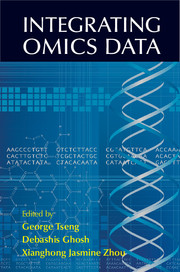Book contents
- Frontmatter
- Contents
- Contributors
- Introduction
- Part A Horizontal Meta-Analysis
- Part B Vertical Integrative Analysis (General Methods)
- 6 Identify Multi-Dimensional Modules from Diverse Cancer Genomics Data
- 7 A Latent Variable Approach for Integrative Clustering of Multiple Genomic Data Types
- 8 Penalized Integrative Analysis of High-Dimensional Omics Data
- 9 A Bayesian Graphical Model for Integrative Analysis of TCGA Data: BayesGraph for TCGA Integration
- 10 Bayesian Models for Flexible Integrative Analysis of Multi-Platform Genomics Data
- 11 Exploratory Methods to Integrate Multisource Data
- Part C Vertical Integrative Analysis (Methods Specialized to Particular Data Types)
- Index
- Color plates
11 - Exploratory Methods to Integrate Multisource Data
from Part B - Vertical Integrative Analysis (General Methods)
Published online by Cambridge University Press: 05 September 2015
- Frontmatter
- Contents
- Contributors
- Introduction
- Part A Horizontal Meta-Analysis
- Part B Vertical Integrative Analysis (General Methods)
- 6 Identify Multi-Dimensional Modules from Diverse Cancer Genomics Data
- 7 A Latent Variable Approach for Integrative Clustering of Multiple Genomic Data Types
- 8 Penalized Integrative Analysis of High-Dimensional Omics Data
- 9 A Bayesian Graphical Model for Integrative Analysis of TCGA Data: BayesGraph for TCGA Integration
- 10 Bayesian Models for Flexible Integrative Analysis of Multi-Platform Genomics Data
- 11 Exploratory Methods to Integrate Multisource Data
- Part C Vertical Integrative Analysis (Methods Specialized to Particular Data Types)
- Index
- Color plates
Summary
Abstract
In biomedical research, a growing number of measurement platforms and technologies are being used to assess diverse but related information on a set of common samples. This motivates integrative methods for multisource data, in which multiple data sets are derived from a common set of objects. This chapter addresses exploratory methods for multisource data. We discuss the need for flexible approaches that simultaneously model the dependence and the heterogeneity of the sources and describe two such methods in detail: joint and individual variation explained (JIVE) and Bayesian consensus clustering (BCC). JIVE is a general decomposition of variation for multisource data. The decomposition consists of three terms: a low-rank approximation capturing joint variation across sources, low-rank approximations for structured variation individual to each source, and residual noise. JIVE quantifies the amount of joint variation between sources, reduces dimensionality, and allows for visual exploration of joint and individual structure. BCC is a tool to cluster a set of objects based on multisource data. The model permits a separate clustering of the objects for each source that adhere loosely to an overall clustering.We describe a Bayesian framework for simultaneous estimation of the source-specific and overall clusterings. We illustrate JIVE and BCC with applications to publicly available data from the Cancer Genome Atlas.
Introduction
The field of exploratory data analysis encompasses a wide range of statistical methods that are used to identify, summarize, and display the main characteristics of a data set. Exploratory methods are not meant to test prespecified hypotheses or make out-of-sample predictions. Rather, they are meant to aid our overall understanding of the data and to guide further analyses. Exploratory approaches play an important role in the analysis of high-dimensional omics data, where scientific hypotheses can be innumerable.
Well-established multivariate techniques are used to explore a single highdimensional data set. We list three such approaches:
• Association mining methods. These measure hundreds to millions of pairwise variable associations, which can be visualized as networks or correlation heatmaps.
• Factorization methods like principal components analysis (PCA) and probabilistic factor models. These help to reduce the dimensionality of the data and identify the primary modes of variation in a data set.
- Type
- Chapter
- Information
- Integrating Omics Data , pp. 242 - 268Publisher: Cambridge University PressPrint publication year: 2015



